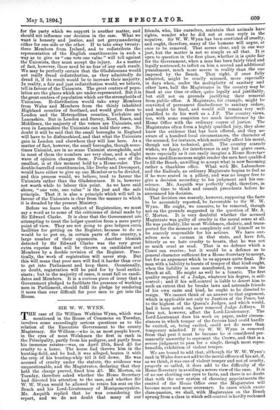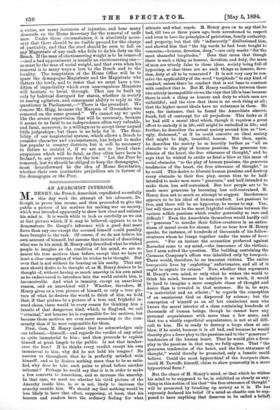SIR W. W. WYNN. T HE case of Sir William Watkins
Wynn, which was mentioned in the House of Commons on Tuesday, involves some exceedingly serious questions as to the relation of the Executive Government to the county Magistracy. Sir William—who is, as most people know, in the eyes of most Welshmen the first in rank in the Principality, partly from his pedigree, and partly from his immense estates—was, on April 25th, fined £5 for cruelty to a horse. The horse had thrown him in the hunting-field, and he had, it was alleged, beaten it with the crop of his hunting-whip till it fell down. He was accused of cruelty under the statute, the evidence was unquestionable, and the Magistrates, declaring that they held the charge proved, fined him £5. Mr. Morton, on Tuesday, therefore asked whether the Home Secretary had directed his attention to the case, and whether Sir W. W. Wynn would be allowed to retain his seat on the Bench and his Lord-Lieutenancy of Montgomeryshire. Mr. Asquith replied that be was considering the report, and we do not doubt that many of our friends, who, like ourselves, maintain that animals have rights, wonder why he did not at once reply in the negative. Sir W. W. Wynn has been convicted of cruelty, and ought, therefore, many of the humane will argue, at once to be removed. That seems clear, and in one way just, but the matter is not so simple as all that. It is open to question in the first place, whether it is quite fair for the Government, when a man has been fairly tried and legally sentenced, to inflict on him a second and additional punishment, much more severe in reality than the one imposed by the Bench. That right, if once fully admitted, might be cruelly misused, more especially in days when, under the multiplicity of sanitary and other laws, half the Magistrates in the country may be fined at one time or other, quite legally and justifiably. but still not on grounds justifying their removal from public office. A Magistrate, for example, might be convicted of permanent disobedience to sanitary orders, and might be fined, and would still remain very well qualified to do his work as a J.P. The country views, too, with some suspicion too much interference by the Home Office with the ordinary course of justice. The Magistrates often form a highly qualified jury, they alone know the evidence that has been offered, and they are aware of a hundred local circumstances, the character of the accused, for instance, which materially affect his moral, though not his technical, guilt. The country scarcely wishes, we fancy, for interference in any but grave cases, more especially as it can easily imagine a Home Secretary whose meddlesomeness might render the men best qualified to fill the Bench, unwilling to accept what is now becoming rather a thankless office. What with Mr. Laboucbere and the Radicals, an ordinary Magistrate begins to feel as if he were seated in a pillory, and was no longer free to give a decision according to his judgment and his con- science. Mr. Asquith was perfectly right, therefore, in taking time to think and consult precedents before he announced his decision.
That decision can scarcely, however, supposing the facts to be accurately reported, be favourable to Sir W. W. Wynn. He ought, we conceive, to be removed, though not on the grounds suggested in the question of Mr. A. C. Morton. It is very doubtful whether the accused Magistrate was guilty of cruelty in the moral sense at all. He was probably, like most Welshmen, choleric, and trans- ported for the moment so completely out of himself as to be scarcely responsible for his actions. We have our- selves seen a carman in that state, and have felt, bitterly as we hate cruelty to beasts, that he was not so much cruel as mad. That is no defence which a Court can receive ; but it would be a defence as to general character sufficient for a Home Secretary to accept, but for an argument which to us appears quite final. No man with a liability to bursts of temper of that kind ought, when the liability is once manifested, to remain on the Bench at all. He might as well be a lunatic. The first quality required of a Judge, whatever his degree, is self- control ; and if his self-control is liable to desert him to such an extent that he breaks laws and astounds friends of his own caste and kind, he ought to be directed to resign. We cannot think of an answer to that argument, which is applicable not only to Justices of the Peace, but to the highest of the Queen's Judges, and which would, had it been acted on, have removed Judge Jeffreys. It does not, however, affect the Lord-Lieutenancy. The Lord-Lieutenant does his work on paper, under circum- stances in which temper of the furious kind could hardly be excited, or, being excited, could not do more than i temporary mischief. If Sir W. W. Wynn is removed _ from that post it must be because be is considered per- manently unworthy to represent the Crown, and that is a severe judgment to pass for a single, though most repre- hensible, exhibition of violent temper.
We are bound to add that, although Sir W. W. Wynn's rank in Wales does not add to the moral offence of his act, if, as we think, it was one of violent temper and not of cruelty, properly so called, it does add to the difficulty of the Home Secretary in avoiding a severe view of the case. It is of no use shutting our eyes to facts, and there is no doubt that with the new system of choosing appointments the control of the Home Office over the Magistrates will become more and more necessary. In cases which excite class-passion, we shall, with Magistrates on the Bench sprung from a class in which self-control is hardly reckoned a virtue, see many instances of injustice, and hear many demands on the Home Secretary for the removal of unfit men. Under those circumstances, it is absolutely neces- sary that there should be no visible ground for the charge of partiality, and that the steel should be seen to fall on any Magistrate of any rank who fails to do his duty on the Bench. If the man of electioneering weight is to be removed. —and a bad appointment is usually an electioneering one— so must be the man of social weight, and that even when his removal is in many ways a loss to the Bench and to the locality. The temptation of the Home Office will be to spare the demagogue-Magistrate and the Magistrate who flatters the lowly, and to resist that we must have a tra- dition of impartiality which even unscrupulous Ministers will hesitate to break through. That can be built up only by habitual disregard for status, whether in society or among agitators, and consequent ability to reply to the questioner in Parliament,—" There is the precedent. We remove Mr. Higg, because the Marquis of Greenshire was removed on the same ground." We cannot say we quite like the severe supervision that will be necessary, because it seems to us fatal to an independence often very valuable, and fatal, moreover, to a willingness to accept these unpaid little judgeships ; but there is no help for it. The flexi- bility of our magisterial system, which allows a Bench to consider character and circumstances, has helped to make law popular in country districts, but it will be necessary in future to restrict it, if we are not to breed class- suspicions which will be fatal, as they often have been in Ireland, to any reverence for the law. "Let the Peer be removed, lest we should be obliged to keep the demagogue," must henceforward be the idea of Home Secretaries, whether their own instinctive prejudices are in favour of the demagogue or the Peer.







































 Previous page
Previous page